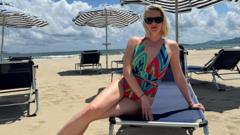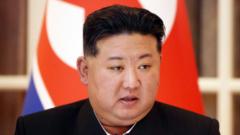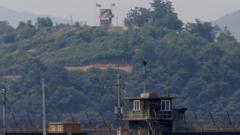Russian tourists like Anastasia Samsonova experience a uniquely curated getaway at Wonsan Kalma, a beach resort in North Korea, amid stringent controls and harsh realities that shadow the allure of this secluded paradise.**
The Enigmatic Allure of North Korea’s New Resort: A Cautionary Vacation**

The Enigmatic Allure of North Korea’s New Resort: A Cautionary Vacation**
A glimpse into the tightly regulated tourism at North Korea's Wonsan Kalma, a resort with stark contrasts and uncertain futures for visitors.**
Anastasia Samsonova's recent vacation at Wonsan Kalma, North Korea's newly unveiled coastal resort, provides insights into the unusual intersection of tourism and strict state control. Opened on July 1, 2023, this exclusive beach destination is situated along the eastern coast, a personal favorite of leader Kim Jong Un during his youth.
In a nation otherwise mostly closed off to international visitors, the resort was initially marketed to global tourists. However, it is currently only accessible to organized groups of Russians, a reflection of North Korea's complex geopolitical relationships post-COVID-19.
The environment in Wonsan Kalma stands in stark contrast to traditional beach locales. Tourist interactions are overseen by security personnel, ensuring that all activities stay within an approved itinerary. Samsonova describes walking through nearly deserted beaches, where pristine conditions are the norm and restrictions on photography are strictly enforced. Tourists are advised against interacting with locals, reportedly to avoid surprising them after years of isolation.
Despite the limitations, Samsonova found enjoyment in the tranquility of the beaches, which were kept immaculate and well-maintained. The absence of crowded lounges and refreshing nature rekindled her spirit, even as her experiences were overshadowed by the apparent disparity between visitors’ comforts and the conditions faced by North Koreans themselves, particularly when it comes to labor rights around the resort's construction.
While the allure of Wonsan Kalma may attract Russian holidaymakers, it prompts concerned reflections on the ethics of tourism in a country known for its human rights violations. Tours, costing around $1,800, include housing and meals, yet the overall experience is marked by a unique juxtaposition of leisure amidst stark state oversight.
Amid growing speculation regarding further openings to international travelers, the regularity of tours remains uncertain. Even neighboring China's citizens face barriers to accessing this unique getaway. Experts suggest that limiting foreign access serves North Korean interests, carefully curating the narrative that visitors receive under strict observation.
With ongoing issues around the treatment of workers involved in the resort's creation, the venture represents the larger challenges of tourism in a politically sensitive landscape. Nonetheless, Zimmernova has expressed interest in returning for another visit, potentially alongside friends, reflecting both a curiosity for the "exotic" and a cautious acceptance of the complex reality behind North Korean allure.
The rise of tourism from Russia indicates a gradual and cautious reopening, but it continues to be marked by strict regulation, potential ethical dilemmas, and the inescapable shadow of the regime’s overarching control.















